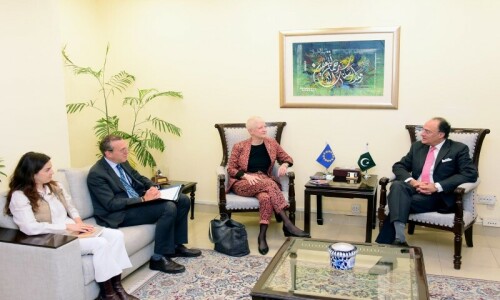BETWEEN 1971 and 2005, over four million Pakistanis went to work in Saudi Arabia. That number may only have doubled since then.
An overwhelming majority of them are blue-collar workers — labourers, taxi drivers, construction workers. The desert has held promises which could never be fulfilled back home. And every once in a while, when the men (for all of them are men) go home, they do so bearing gifts for their loved ones brought by pinching pennies, calculating how much more the money would be worth back in Pakistan if only they could do without a third meal in the day. Perhaps even a single meal should be enough. These men don’t take up a lot of space. Sometimes a dozen or so cram into one small apartment, just enough to entertain slumber after a long day of back-breaking work.
Life can be physically and emotionally taxing for a migrant worker, spending months or even years without meeting their loved ones. But the rewards are not insignificant. For Pakistan, the combined wealth pouring into the country as a result of remittances is a major source of revenue. Our reliance on it is ever-increasing. In 2019-2020, Pakistan hit a record high of $23 billion in remittances from abroad.
The prime minister’s ire expressed recently on the treatment of these Pakistanis at the hands of the diplomatic mission in Saudi Arabia is then well justified. His displeasure resulted in the ambassador being called back and replaced by a retired general. Six other embassy officers have also been asked to pack their bags. Foreign Minister Shah Mahmood Qureshi, who has just returned from an official trip to Iran, emphasised the importance his government attaches to the welfare of overseas Pakistanis, a salient feature of PTI’s manifesto.
Pakistanis are left to fend for themselves in the Middle East.
However, the concern for the Pakistani diaspora in the kingdom while commendable is also transient. For Pakistan to adequately represent the interests of its people in other countries, it needs a uniform consular policy that provides for all the things migrant workers in Saudi Arabia are complaining to the prime minister about. Till then, all measures and shows of concern will be ad hoc and ineffective. And nowhere do we need it the most than in the Middle East.
Gulf countries have been a popular destination for all Asian countries, particularly Pakistan. Four of the six Gulf countries — Saudi Arabia, UAE, Kuwait and Oman —were featured in the top 10 destinations for South Asian nationals in 2017.
Unfortunately, though, once Pakistanis land in these countries, they are left to fend for themselves. And that fending is not always easy. It can sometimes come at a considerable cost: your freedom. Getting entangled in a foreign criminal justice system is easier than it seems. As a result, around 10,000 Pakistanis are currently imprisoned in foreign jails, with the highest numbers of these prisoners in the UAE and Saudi Arabia.
In the absence of permanent mechanisms, it is near impossible for Pakistani missions abroad to protect the rights of such a large number of migrant workers. Consequently, Pakistanis suffer rampant violations of due process. They spend long periods of detention without charge or trial, have no access to legal assistance and struggle to navigate the Saudi criminal justice system without adequate translation services. Many also complain the embassy staff does not answer calls or visit jails regularly as they are supposed to.
Our prime minister thankfully seems very aware of the plight of these migrant workers and prisoners. This is not the first time he has voiced alarm over the treatment of Pakistanis in Saudi Arabia. In February 2019, as Crown Prince Mohammed bin Salman rolled into Pakistan amid much aplomb and applause, Imran Khan requested him to show compassion to Pakistanis imprisoned in the Kingdom. In typical royalty fashion, the prince replied magnanimously: 2,000 Pakistani prisoners were to be released and sent home.
Since then, I have met many families whose loved ones are incarcerated in Saudi Arabia. They all remember watching the news that day and celebrating. Their fathers, mothers, brothers and sisters would be coming home soon.
Many, however, are still waiting.
While definitive figures of how many prisoners have returned have not been divulged by Pakistani authorities, a research by Justice Project Pakistan in 2019 stated that more than a year after the promise was made, less than 90 people had been brought back. Since then, some more prisoners have returned, particularly those pardoned on special occasions like Eid. However, thousands still remain in custody. In a pandemic, their misery has only been compounded manifold.
With Eid around the corner, and a fresh set of hands on deck in the Pakistani mission in Saudi Arabia, this is an opportune time for Pakistan to request the kingdom to release the prisoners it had promised to.
The writer works for Justice Project Pakistan.
Twitter: @haiderhabib
Published in Dawn, May 2nd, 2021












































